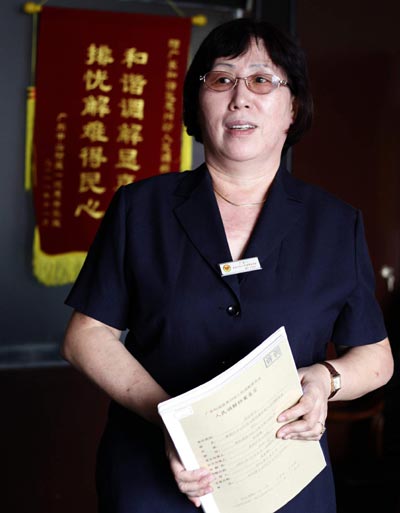When a second career proves most rewarding
 |
|
Wu Bing, 57, works as a mediator for doctor-patient disputes after retirement. Zou Zhongpin / China Daily |
Wu Bing, 57, could have chosen a relaxing and comfortable life after retirement.
Instead, she is now doing a job which most people avoid -a mediator for doctor-patient disputes, an occupation which is vulnerable to violence.
With more than a decade of working experience at military hospitals before she became a banker, Wu was recruited by the Guangdong doctor-patient dispute conciliation committee in 2010.
"I was thinking of doing something after I retired when I found out that the non-governmental organization was hiring," says Wu. "If I were to stay home, I would have to face my husband every day," she says in jest.
The committee has been the answer to increasing disputes, usually involving fatal cases, in which the two sides argue about who is responsible for the accident and compensation.
In the first half of this year, Wu and her team of five members handled 127 cases involving more than 30 hospitals in four cities in Guangdong province. A total of 97 of the disputes have been solved.
Of the claims, 26 involved violent protests by patients. Some 60 of the cases were related to claims, of which 50 were granted compensation.
"Our team has been the most efficient," Wu says with pride.
She wrapped up her first case in two and a half days. "I was so excited when I solved my first case. It was such an extraordinary experience."
The hardest part of her job, Wu says, is dealing with the emotions of the patients' relatives - who usually come in big groups. Many are from a poor educational background, do not trust the hospital and are brash.
Wu recalls a case involving a newborn baby who died in the intensive care unit. The family, from Zhejiang province, gathered scores of fellow villagers to stage protests in the hospital every day. They even turned violent, smashing items in the hospital and threatening the life of a hospital worker by gripping his neck.
"The father was out of his senses. During a discussion in one of the meeting rooms, he got so agitated that he threw a water bottle at us and suddenly kicked a chair toward us," Wu says.
"We tried to talk sense to the family members. I asked about the family conditions in the hope of finding a solution. We also talked to the family members separately, hoping that one of them would listen," she says.
The family demanded 1 million yuan ($158,000) in compensation from the hospital. In the end, they accepted more than 80,000 yuan, with the hospital covering the treatment expenses, including the ICU cost.
"We calculated the compensation sum based on the related regulations," she says.
It is also important to get a clear picture of the structure and details of a family in such a case to determine the arrangement of compensation, Wu adds.
The dispute conciliation committee has adopted a mediation strategy.
"We usually begin our mediation by letting the family talk first. When they get emotional, we try to calm them down. We want them to feel our sincerity.
"I understand that coming from the lowest rung of society and without much money, they can't afford a prolonged lawsuit and hope to solve the case in a timely fashion. They usually become reasonable eventually and rely on us to deal with the cases," explains Wu.
She shares that during the initial period of her service, not only did she suffer the brunt from the patients, the hospital often gave her and her team the cold shoulder.
But their efforts have paid off - most hospitals have changed their attitude and will approach Wu's committee whenever they need their services.
From Wu's experience, the hospitals need to improve their communication to reduce disputes.
Citing an example, she says, one patient only found out that stents had been placed in his heart after the surgery. In some cases, the critical condition notice has not been issued in a timely manner.
Some conflicts were due to negligence. For example, there was a case involving nurses who did not monitor the patients closely when they patrolled the wards.
On the other hand, there were patients or their families with the bad intention of making a fortune out of a simple dispute.
The committee hopes to recruit more young members as currently most of them are retirees. With plans to set up branches in more cities in the province, Wu says the committee will train more mediators to cope with the workload.
Shu Meng contributed to the story.
liwenfang@chinadaily.com.cn
















